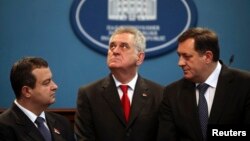SARAJEVO —
Serbia's nationalist president has implored forgiveness for the 1995 Srebrenica massacre in Bosnia, in his deepest apology yet for crimes committed by Serbs in the wars that destroyed Yugoslavia.
"I'm on my knees," President Tomislav Nikolic told a television interviewer. "I am on my knees and asking for a pardon for Serbia for the crime that was committed in Srebrenica. I apologies for the crimes that any individual has committed in the name of our state and our people."
The contrite statement by Nikolic, once a disciple of the Greater Serbia ideology that fueled the Yugoslav wars of the 1990s, marked a sharp change of tone that could help the slow process of reconciliation between Serbia and Bosnia as they edge towards a common goal of European Union membership.
Serbia's relations with its neighbors are under close scrutiny from the EU, which gave it a tentative green light on Monday to start accession talks this year.
Bosnian Muslim leader Bakir Izetbegovic publicly upbraided Nikolic on a visit to Belgrade this week and said he should face the truth of what went on in Bosnia before the region could move on.
Zeljko Komsic, the Croat member of Bosnia's tripartite presidency, told Bosnian state radio he was "positively surprised" by Nikolic's apology and said it should help improve ties between the two countries.
Some 8,000 Muslim men and boys died in Srebrenica, a former U.N. "safe haven" that fell to Bosnian Serb forces under wartime commander Ratko Mladic. The victims were rounded up, executed and bulldozed into pits over five days in July 1995.
Genocide comments
A former member of an extreme nationalist party, Nikolic has previously upset Serbia's neighbors and drawn fire from the West when speaking of what went on during Yugoslavia's collapse. After taking power last year, he denied that the Srebrenica massacre constituted genocide, as a United Nations court has ruled.
Pressed in the new interview on that issue, he replied: "Genocide must be proven." But he added that "everything that happened during the wars of the former Yugoslavia had the characteristics of genocide."
Bosnian media reported that Nikolic had also pledged to visit Srebrenica, but not on the July 11 anniversary of the worst mass killing on European soil since World War II.
Around 100,000 people were killed during Bosnia's 1992-95 war, when Mladic's forces, using the big guns of the Serb-dominated Yugoslav army, seized swathes of land and drove out non-Serbs. Fighting between Serb, Croat and Muslim forces tore the country apart.
Nikolic's predecessor as president, Boris Tadic, visited Srebrenica and pushed through a parliament resolution in 2010 apologizing for the massacre. That text also stopped short of calling it genocide.
Nikolic made his comments in a short video trailer released on a Sarajevo web portal by independent Bosnian production "Interview 20." The full interview is due to air on Bosnian state television on May 7.
"I'm on my knees," President Tomislav Nikolic told a television interviewer. "I am on my knees and asking for a pardon for Serbia for the crime that was committed in Srebrenica. I apologies for the crimes that any individual has committed in the name of our state and our people."
The contrite statement by Nikolic, once a disciple of the Greater Serbia ideology that fueled the Yugoslav wars of the 1990s, marked a sharp change of tone that could help the slow process of reconciliation between Serbia and Bosnia as they edge towards a common goal of European Union membership.
Serbia's relations with its neighbors are under close scrutiny from the EU, which gave it a tentative green light on Monday to start accession talks this year.
Bosnian Muslim leader Bakir Izetbegovic publicly upbraided Nikolic on a visit to Belgrade this week and said he should face the truth of what went on in Bosnia before the region could move on.
Zeljko Komsic, the Croat member of Bosnia's tripartite presidency, told Bosnian state radio he was "positively surprised" by Nikolic's apology and said it should help improve ties between the two countries.
Some 8,000 Muslim men and boys died in Srebrenica, a former U.N. "safe haven" that fell to Bosnian Serb forces under wartime commander Ratko Mladic. The victims were rounded up, executed and bulldozed into pits over five days in July 1995.
Genocide comments
A former member of an extreme nationalist party, Nikolic has previously upset Serbia's neighbors and drawn fire from the West when speaking of what went on during Yugoslavia's collapse. After taking power last year, he denied that the Srebrenica massacre constituted genocide, as a United Nations court has ruled.
Pressed in the new interview on that issue, he replied: "Genocide must be proven." But he added that "everything that happened during the wars of the former Yugoslavia had the characteristics of genocide."
Bosnian media reported that Nikolic had also pledged to visit Srebrenica, but not on the July 11 anniversary of the worst mass killing on European soil since World War II.
Around 100,000 people were killed during Bosnia's 1992-95 war, when Mladic's forces, using the big guns of the Serb-dominated Yugoslav army, seized swathes of land and drove out non-Serbs. Fighting between Serb, Croat and Muslim forces tore the country apart.
Nikolic's predecessor as president, Boris Tadic, visited Srebrenica and pushed through a parliament resolution in 2010 apologizing for the massacre. That text also stopped short of calling it genocide.
Nikolic made his comments in a short video trailer released on a Sarajevo web portal by independent Bosnian production "Interview 20." The full interview is due to air on Bosnian state television on May 7.





